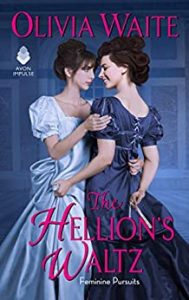Amazon Affiliate Link | Bookshop.org Affiliate Link
The Hellion’s Waltz is the third installment of Olivia Waite’s Feminine Pursuits series, and where the first two involved astronomy, printing, and beekeeping, this one revolves around music, weaving, and crime. With the re-surfacing of the hit tv show Leverage, I was quite excited to read a crime romance, and this series hadn’t let me down yet.
Maddie Crewe and the local weaver’s guild are planning a con on a businessman whose unsavory practices are taking advantage of the local weavers and pushing them out of business or into dangerous factories. With their ability to legally organize coming down the pipeline, Maddie and her friends need one good score to properly fund their guild and give their future organizing some teeth. Meanwhile, Sophie Roseingrave’s family has just arrived in town after being forced from London when a con artist’s scheme ruined their reputations and forced their family shop to close. When she accidentally brushes up against the opening stages of Maddie’s con, she’s torn between her instant attraction to the other woman and her instinctive revulsion towards a scam, no matter how well-intentioned.
As usual with this series, the characters are charming to read. I loved that they were both talented women in their own fields – Maddie as a weaver and Sophie as both a musician and piano tuner. I loved that neither had any sort of queer awakening during this; being attracted to a woman and acting on that desire wasn’t news or a shock to either of them. They’re both quite taken with each other and are willing to act on their attraction. It’s still refreshing to me to read historical romances where both characters are confident and confidently queer, and I adore it.
Also, who doesn’t love a good crime crew when they’re out to take down a heinous rich guy? And crime to fund a union is especially delicious. The con itself is a little complicated and far-fetched to seem entirely plausible, but it’s fun, and its hilarious hijinks are a good contrast to Sophie’s memories of getting taken in by a dastardly con man who but their piano-making business out of order. Maddie and the weavers are not out to harm families, but rather to protect them. The confidence they have to stand up for themselves helps Sophie to face her lingering trauma after her family’s own experiences and take up music again.
In conclusion, The Hellion’s Waltz is a fun little romp through crime, protecting a community of craftspeople, and letting yourself have good things. It’s fun, not especially deep, and the queerness is established rather than a plot point. It was a very diverting and fun read, and I recommend it if you are looking for a nice f/f historical romance that’s on the light side.



